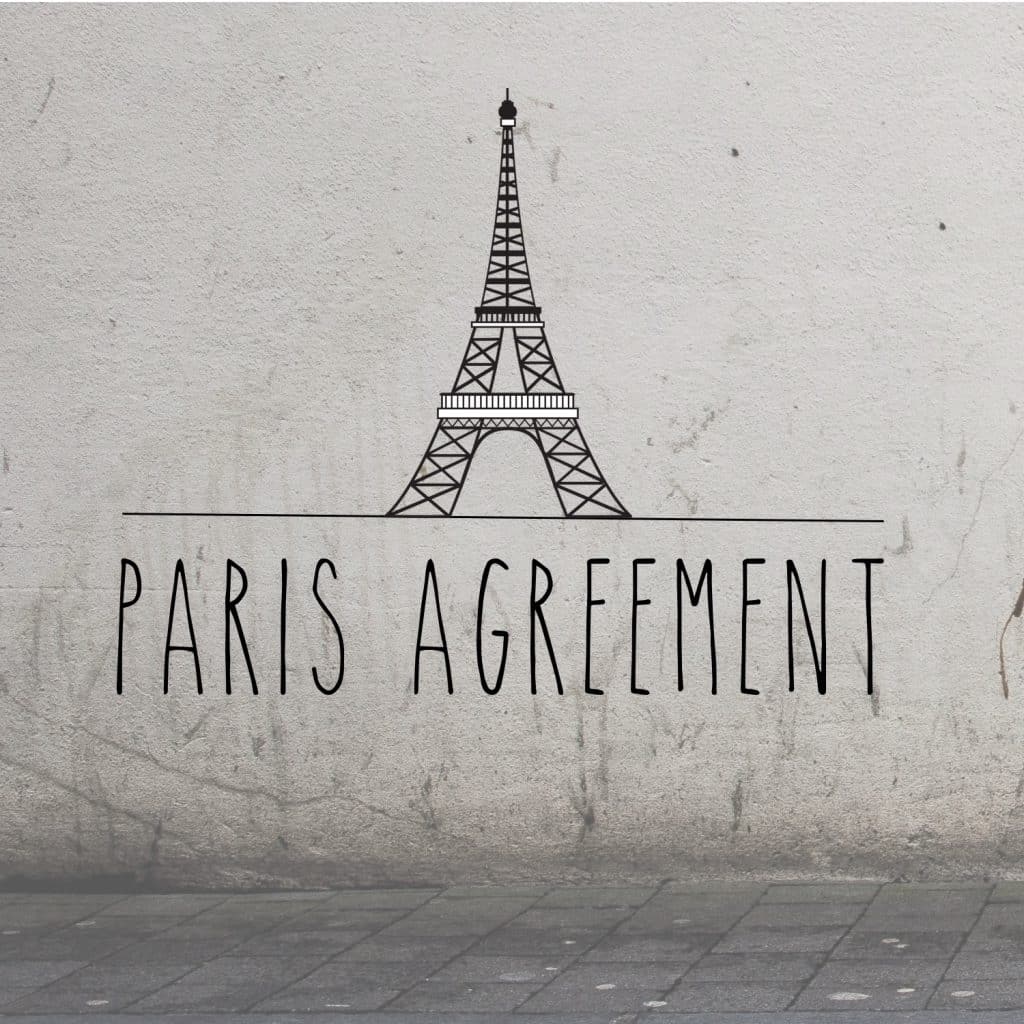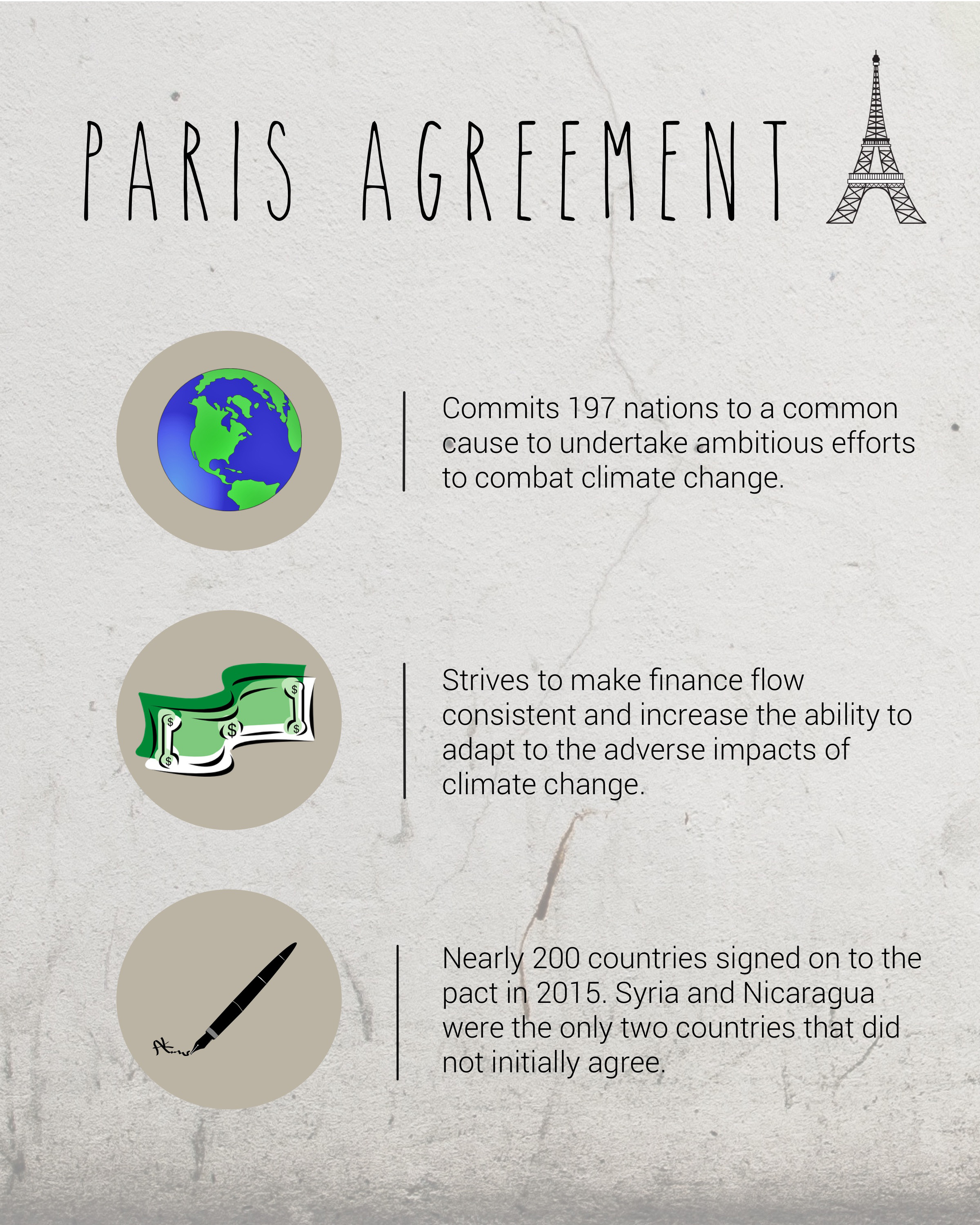
Opinion: The Paris Agreement: reasons we should stay and reasons we won’t
Lane Koch, Associate Writer
In December of 2015, environmentalists around the world celebrated, if a little reluctantly, the signing of the Paris Accord. This was a small, but monumental step toward a climate-neutral society. This agreement, signed by 196 countries around the world, was seen as a step towards a greener world.
Many environmentalists were unsatisfied, however. They felt the rising of carbon emissions and greenhouse gases were still going to be exponentially high. In fact, Nicaragua and Syria refused to sign the agreement, saying it did not go far enough.
This past June, in a rose garden address, President Trump declared that the U.S. will withdrawal from the agreement.
He cited reasons such as his campaign promise to nix job-killing regulations, his issues with other countries not being upheld to the same standards financially, the financial burden of helping underdeveloped countries and what he sees as minute environmental benefits.
But is he right? Is this a bad deal?
First, we have to look at the Accord itself.
What does it say?
Graphic created by staff artist Courtney Chestnut.
This agreement is meant to be extremely ambitious. It sets goals it understands will not be met, but that should be set regardless.
The Paris Accord is a pact wherein by 2020 each country must assess its own environmental impact and contribute a plan to lower its greenhouse gas emissions and make environmentally friendly goals, such as stepping away from fossil fuels and towards cleaner forms of energy.
Every country will then meet every five years to discuss whether or not they are reaching their goals and set new goals for the future.
The plan also sets forth steps to manage what the agreement calls “inevitable” losses as a result of climate change.
The plan also states that the developed world will financially contribute—with each developed country creating a pledge amount of its choosing– to underdeveloped countries in total 100 billion dollars a year.
Trump statements vs. reality
First, the president feels that the regulations we would put forward in this plan would kill jobs in fossil fuels (coal)–and in part he is right. Jobs would be lost in fossil fuels—they already are. These jobs have been disappearing for years due to adaption of the cheaper, more environmentally friendly natural gas. It is natural in our history, for an industry’s jobs to dwindle in the light of technological advancements; that is free market capitalism pairing with technological determinism to produce change.
Second, the president states that countries like China, India and countries in Europe could all open up hundreds of coal plants, but the U.S. can’t. The only restrictions this deal actually gives are the ones a country gives itself. The countries themselves come up with their own goals and limitations. And due to the lack of enforcement mechanisms or ‘teeth’ the arrangement lays no binding consequence to countries that do not meet expectations. That is why it is an agreement, instead of a treaty.
Also the president speaks in ambiguous terms about the costs, “billions and billions.” Out of this $100 billion that is thrown out in cost, the U.S. would pay $3 billion in a bill towards the Green Climate Fund. We have already paid $1 billion to the fund and since we create our own goals, we can reduce this amount.
Trump is correct in his final point, though. Even if every country does what they pledge, we will still exceed our limit of two degrees celsius.
But that is not a reason we should refuse to take steps to lower our emissions.
We should stay in this deal
America is not “the world’s leader in environmental protection” as Trump stated in his rose garden address. In fact, according to the Environmental Protection Agency (EPA), America is the second greatest carbon emitter in the world, challenged only by China.
Consider the ramifications of a president that called for a race to a cleaner energy source before the end of the decade; the legacy of a president that held the country to expectations.
John F. Kennedy did it.
And we ended up on the moon.
We should stay in this deal because the world is coming together to find ways to be better. America should want to be the first to come up with cleaner sources of energy. So we can stop relying on other countries for oil, so we can lead the world in advancement, so we can truly–make America great again.
But we won’t
We won’t stay in this deal. It’s all about campaign promises. Trump ran on a promise to get coal country back to work—to throw Obama’s policies out the door. And considering health care isn’t going so well, his rolling back of Obama’s legislation on the environment will have to do. It’s all about re-election.
The views and opinions expressed in this editorial are solely those of the original author(s) These views and opinions do not necessarily represent those of Vision Media or North Greenville University.

